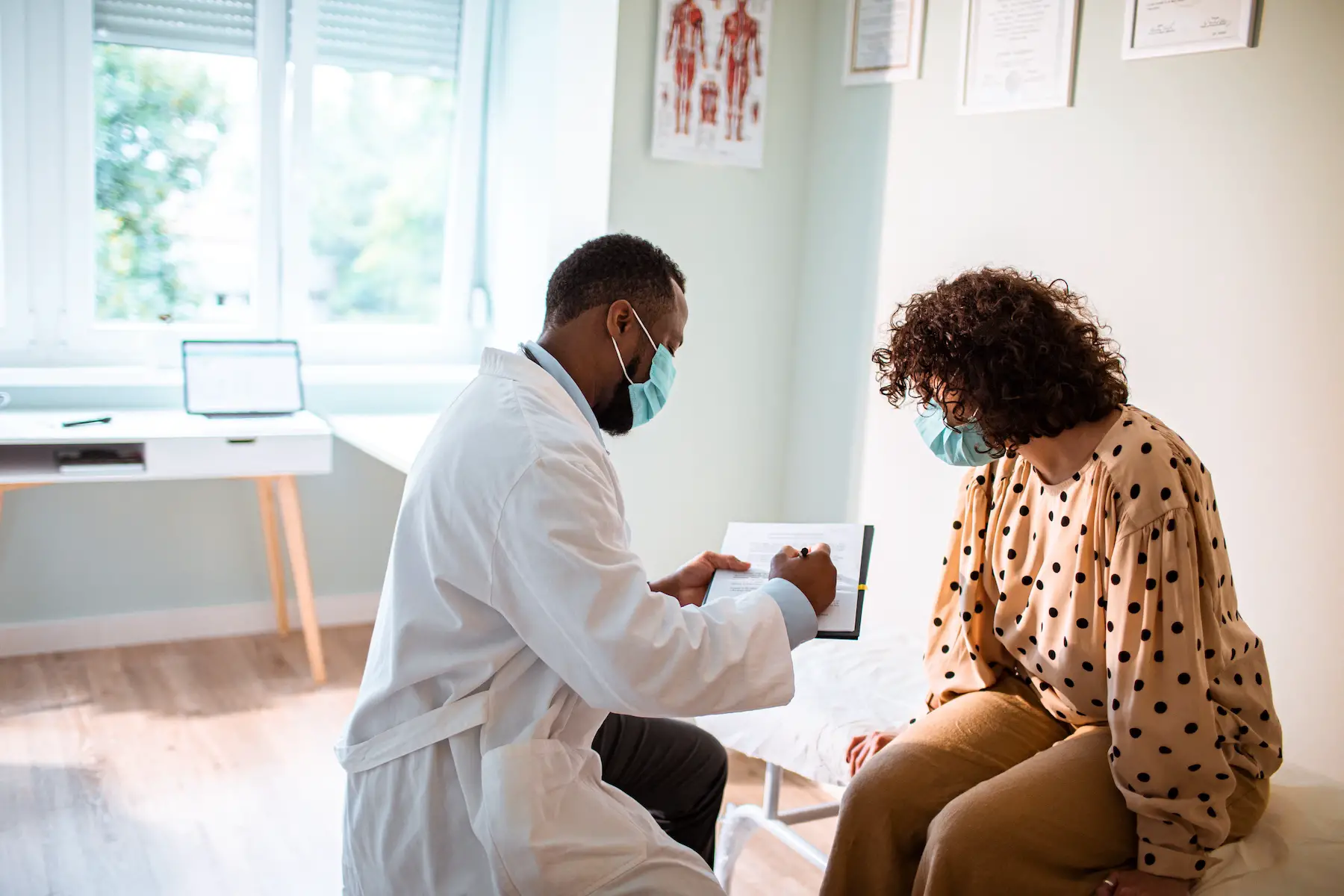Fortunately for internationals moving to Germany, the country boasts a reputable healthcare system that allows access to comprehensive sexual health services. Rest assured that your health will be in good hands once you’ve set up a new life in Germany. That said, navigating all the medical channels can feel daunting, especially if you don’t speak German and face a language barrier.
Keep reading for more on the basics of sexual and reproductive health in Germany, including:
- German attitudes towards sex and sexuality
- Accessing sexual health services in Germany
- Insurance for sexual and reproductive health in Germany
- Sexual health cancer screenings in Germany
- Menstrual health in Germany
- German contraception options
- Abortion in Germany
- STIs/STDs in Germany
- Pregnancy and childbirth in Germany
- Services dealing with sexual issues
- Services dealing with sexual abuse and assault
- Young people’s sexual health in Germany
- LGBTQIA+ sexual health in Germany
- Useful resources
Cigna Global
Enjoy peace of mind while living in Germany with Cigna Global’s long-term international health insurance plans (12+ months). Get tailored coverage, direct billing with many providers, complex case management, and global care on demand, with access to a network of 1.5+ million doctors, specialists, and therapists.
German attitudes towards sex and sexuality
Compared to other countries worldwide and even throughout Europe, Germany has a reputation for being a liberal nation when it comes to general attitudes toward sex and sexuality. According to the 2023 German Health and Sexuality Survey (GeSiD), the majority of respondents approve of same-sex sexual activities and of sex without love. However, sex with different partners was generally met with disapproval, as was cheating on a spouse.

Germany ranks highly as a sexually satisfied nation, and the government has mandated sex education in schools since 2002. Luckily for those who call the country home, Germany also has a high-quality healthcare system, which offers easy access to a range of sexual health services.
Accessing sexual health services in Germany
All foreigners living and working in Germany can access subsidized state healthcare, which covers a wide variety of sexual health services. However, before they can do so, they must have health insurance. They can either register with a statutory German health insurance scheme (Gesetzliche Krankenversicherung – GKV) or a private insurance scheme (Private Krankenversicherung – PKV).
While most German workers remain on the statutory scheme, some internationals take out more comprehensive private health insurance for more coverage and shorter wait times. But regardless of whether you use a private or public scheme, German health insurance contributions are split between employers and employees.
Once you have insurance, you can access a vast network of doctors that provide sexual health services throughout Germany. General practitioners can address basic issues, conduct tests, and refer their patients to specialist doctors when necessary.
Gynecologists also deal with many aspects of women’s health, including sexual health. They can carry out a wide range of consultations and procedures. Typically, all gynecologists will accept private and public insurance and don’t require a referral from a doctor.
You can also access online consultations in English for a charge through platforms like Mobi Doctor.
Local German sexual health services
Aside from doctors, local pharmacies (Apotheken) can provide basic information and counseling regarding minor issues such as yeast infections. In this case, they may recommend over-the-counter remedies. Pharmacies also sell sexual health items such as condoms, pregnancy tests, and lubricant. Many drugstore chains and even grocery stores in Germany also stock these items.
Meanwhile, non-profit organizations provide consultations and assistance with sexual health issues, including birth control and STIs. Liebesleben can help you find services and practitioners through its website, which has English navigation. The organization can also help those without German insurance find free or low-cost services. This includes neighborhood clinics that perform free HIV testing and birth control counseling.
Insurance for sexual and reproductive health in Germany
If you are an EU citizen and fall ill during a temporary stay in Germany, you can use your European Health Insurance Card (EHIC) to access urgent sexual healthcare. This should cover the costs of emergencies or problems, such as visiting a doctor to get treatment for a urinary tract infection. However, remember that your EHIC will not cover specialized treatments or private care for sexual health matters in Germany.
Otherwise, all residents in Germany must have some form of health insurance, be it public or private. All German health insurance provides extensive coverage for many sexual health services. Therefore, you can rest assured that you are in safe hands.
Public versus private health insurance
Public insurance is more common in Germany and covers most people in paid employment. It sometimes covers their family members, too, as well as pensioners and the unemployed. Public insurance also covers many screenings and tests. Generally, it takes care of services related to pregnancy, birth, and the postpartum period. It also can cover or subsidize some forms of birth control.
Private insurance, on the other hand, is less common and is typically required (or preferred) by certain higher earners. It is also available to those who prefer it, such as the self-employed or civil servants. While private health insurance has higher tariffs, it does have some key benefits. For instance, it may cover some or all of the costs of sexual health treatments that fall under the alternative medicine category.
There are many private health insurance companies operating in Germany. These include large multinational insurers and local German providers offering full and supplementary policies. German health insurance providers include:
You can compare private health insurance providers in Germany and get free quotes on Expatica’s health insurance page, and with tools such as GKV and PKV (in German).
Sexual health cancer screenings in Germany
In 2020, Germany ranked 21st among countries with the 50 highest cancer rates in the world, accounting for 281.9 per 100,000 people. According to data, there were 628,519 new cases in 2020, affecting the breast (69,697), prostate (67,959), lung (64,804), colon (57,528), and bladder (35,147).

Each year Germany holds a National Cancer Prevention Week to raise awareness about various types of cancer. Additionally, many individual institutions for specific cancers place billboards or awareness posters throughout the country at different times of the year.
Screening for cervical cancer
A gynecologist will typically screen for cervical cancer yearly, starting at age 20. The scientific committee Ständige Impfkommission (STIKO) recommends that children between 9 and 14 have the HPV (Human papillomavirus) vaccine. The vaccine is covered by all insurance in Germany and administered by a child’s Kinderarzt (pediatrician).
Screening for breast cancer
Breast cancer is the most common form of cancer affecting women in Germany. Gynecologists offer women aged 30 and up an annual palpation check-up, which all insurance covers.
Women aged 50 and up are eligible for a yearly mammogram, which is performed by a gynecologist and is also covered by all health insurance. If you are considered high-risk due to a family history of breast cancer, you should talk to a gynecologist about additional screening possibilities.
However, there is no specific screening process for men. If you are male and concerned that you may have breast cancer, you should first consult your Hausarzt (general doctor).
Screening for ovarian cancer
There are approximately 7,300 deaths a year from ovarian cancer in Germany. Tragically, ovarian cancer is usually only discovered in its later stages. Screenings for ovarian cancer in Germany are relatively rare, and typically only carried out if there are symptoms or specific concerns. However, they are covered under public and private health insurance if a doctor recommends them.
Screening for prostate cancer
Annually, there are around 60,000 prostate cancer diagnoses and approximately 12,000–14,000 deaths in Germany. For men aged 45 and up, all insurance covers the cost of a rectal screening. However, for a more advanced prostate cancer screening, you will typically have to pay for this yourself. That said, getting some of the screening costs reimbursed by insurance may be possible. It’s best to speak to your Hausarzt or a urologist directly.
Screening for testicular cancer
There are around 4,000 cases of testicular cancer per year in Germany. Currently, the only testicular cancer screening program in Germany is a general check-up and prostate exam for men aged 45 and older. However, if you have concerns about testicular cancer, you can consult your Hausarzt about arranging additional exams and testing.
Screening for penile cancer
Penile cancer is relatively rare in Germany, with less than 950 diagnosed cases yearly. There is currently no specific screening for penile cancer within the German healthcare system. However, men aged 45 and above are entitled to an annual check-up and prostate screening. At this screening, the doctor (typically your Hausarzt or general practitioner) will also briefly check for any concerning symptoms that might indicate the possibility of penile cancer.
Menstrual health in Germany
Germany offers a wide range of menstrual products, available in drugstores or the local Apotheke (pharmacy). Products for purchase include tampons, disposable pads, menstrual cups, cloth pads, and period underwear.

Germany abolished the luxury tax on feminine hygiene products in 2020. The cost of these items has dropped since then. Insurance doesn’t help with the expenses of feminine hygiene products in Germany; therefore, it might be worth looking into reusable options like menstrual cups or cloth pads. Not only do reusable options save money, but they are also more environmentally friendly.
German contraception options
If you live in Germany, you will have access to a variety of contraceptive measures and education. This is partly why the country has high rates of contraceptive usage and a relatively low teenage pregnancy rate.
There are so many different types of contraception that it can be hard to decide which best fits your lifestyle. One of the most important things to consider is a method’s effectiveness. Pro Familia offers help deciding which form of birth control is right for you at their counseling centers.
Here is a list of the various forms of contraception available in the country:
- Hormonal birth control pills – Subsidized by all German health insurance, and is prescribed by a gynecologist; a pack of pills costs approximately €20 for a 3-month supply
- Condoms – Available in any drugstore, pharmacy, and sometimes grocery stores, costing approximately 50 cents each
- Copper IUD – Costs €130–450 for placement, as well as the cost of the exam
- Hormonal IUD – Costs €300–400 for placement, plus the exam cost
- Birth control injections – These cost around €40 and are administered every 12 weeks
- Birth control implant – Lasts up to three years and costs around €300
- Birth control ring – Costs around €15
- Birth control patch – Costs around €15
- Diaphragm – Costs about €50, plus additional costs for spermicide
- Vasectomies and hysterectomies – These are surgical procedures and can cost €500–1,000
- The morning-after pill – Two types are available at German pharmacies without a prescription. Free for women under 18, costs €5 for age 18 or 19, and either €17 or €35 over age 20, depending on which type you get.
German family planning services for sexual health
Germany is also home to an array of family planning services where sexual health practitioners, such as gynecologists, can offer consultations about contraceptive use. There are also various non-profit organizations, such as Pro Familia, that provide free or low-cost counseling.
Abortion in Germany
Abortion (Schwangerschaftsabbruch) is technically illegal in Germany. Still, there is no risk of legal consequences if carried out in the first 12 weeks and after counseling. Beyond that, it is possible to get an abortion up to 22 weeks in specific cases where the person’s health is at risk. Germany offers both medical and surgical options for abortion, depending on how far along the patient is.
Unfortunately, Germany’s small number of qualified abortion clinics can pose a barrier to access. Those living in rural areas may have to travel an hour or more to the nearest abortion provider. As a result, telemedical abortions (Schwangerschaftsabbruch zu Haus) were introduced in 2022. Pregnant people less than eight weeks along can have an online consultation with a physician, then pick up a prescription for the abortion pill and take it at home.

The obligatory pre-abortion counseling (Schwangerschaftskonfliktberatung) can understandably be difficult for some. According to the law, it must be done no less than three days before the procedure, and requires a legally certified counselor. If you are pregnant and considering abortion, you may want to contact an organization that provides safe, unbiased counseling. Nonprofits Pro Familia and AVO have service centers across Germany where you can fulfill the legal obligation for pre-abortion counseling.
STIs/STDs in Germany
If you’d like to get a test for sexually transmitted infections (STIs), your gynecologist, urologist, or Hausarzt can provide this. While you typically have to pay out-of-pocket, you may be able to get the tests covered by insurance if you’re experiencing symptoms.
Alternatively, you can order at-home STI testing kits, which generally cost €39–60. There are also some walk-in clinics throughout the country that provide low-cost or free testing.
If you test positive, you will need to seek treatment from a specialist or ask your Hausarzt to refer you to one. Generally, treatment will involve antibiotics or anti-parasite therapies, and most medications for STIs are covered by insurance.
HIV and AIDS
Germany has particularly low rates of HIV and AIDS, which is largely thanks to excellent sex education, good access to contraception, and high-quality health services. Any Gesundheitsamt (public health service agency) will test you for free and anonymously. General practitioners can also perform HIV tests, and self-tests are available for purchase at pharmacies or online. You can use European Test Finder to locate the nearest place to get tested for HIV.
Public health insurance covers HIV treatments and medications, but patients who are privately insured may only be able to access base-rate insurance policies if they have HIV. Therefore, not every treatment is covered. However, there are many organizations in Germany dedicated to helping people living with HIV and AIDS.
Pregnancy and childbirth in Germany
Whether you opt for public or private health insurance, you can rest assured that you are in safe hands when it comes to having a baby in Germany. Both options will cover all visits to your gynecologist throughout your pregnancy. They will also cover the costs of a midwife (Hebamme) who can conduct a number of prenatal exams and perform postpartum house visits to check in on you and your baby.

However, while public insurance covers most standard procedures and the three major ultrasounds during pregnancy, it doesn’t cover all tests or ultrasounds. For instance, you will need to pay out of pocket for certain things like a toxoplasmosis test or NIPT (noninvasive prenatal testing). If you have private health insurance, you should check your pregnancy testing coverage with your provider beforehand.
Insurance will also cover visits from your Hebamme for approximately two to three weeks postpartum and sometimes further visits for breastfeeding issues. However, you must pay a lactation consultant (Stillberaterin) yourself.
Delivery options
There are three options for giving birth in Germany: in a hospital delivery room (Kreißsaal), in a birth center (Geburtshaus), or at home (Hausgeburt). For the latter options, you will need to have a low-risk pregnancy in order to gain approval from a midwife. Public insurance will cover a stay at a hospital in Germany, but not the costs for a private room. Some private insurance, on the other hand, may cover this.
Both public and private insurance will cover part of the costs of a birth center or home birth. However, you will typically need to make a payment of €300–600. Insurance will also cover the cost of a six-week postpartum check-up by a gynecologist.
Services dealing with sexual issues
Germany has a wide variety of services for dealing with sexual health issues ranging from vaginismus to low sex drive. For some issues, such as vaginal dryness, you may even get some over-the-counter advice and product recommendations at your local Apotheke (pharmacy). However, if the problem is more severe, you should consult your gynecologist, urologist, or general practitioner.

When it comes to sexual issues that are psychological in nature, there are a few types of resources that you can turn to. If you need or want to see a sex therapist through insurance, you will typically need an Uberweisung (written referral) from your gynecologist, urologist, or general practitioner. Whether you have public or private health insurance, you should check how many sessions it will cover and the length of treatment.
Erectile dysfunction treatment
If you are experiencing issues with erectile dysfunction, the first place to seek help is from your general practitioner (Hausarzt). They can prescribe medication for erectile dysfunction or refer you to a specialist if required.
Some of the available treatments in Germany include medication, an implant, vacuum therapy, and psychotherapy. Insurance may cover some of these, but you should talk to your doctor and provider about the costs beforehand.
Services dealing with sexual abuse and assault
Sexual assault and rape are both against German law. If someone experiences bodily harm, the person is also entitled to compensation as per the Victims Compensation Act (Opferentschädigungsgesetz – OEG).
Germany has a free telephone hotline for violence against women called the Hilfetelefon Gewalt gegen Frauen. It offers 24/7 assistance in 17 languages, including English. There is also a database where you can find free counseling services for sexual assault nationwide.
The victim of a sexual assault and any witnesses can file a criminal complaint. When physical evidence of the crime exists, the police typically want to use it as part of the case. If a victim sees a doctor after the assault, that can also become part of the evidence.
Young people’s sexual health in Germany
Sex education and sexual health services for young people are very comprehensive in Germany. Since 1992, sex education has been mandatory in German schools. However, the age at which sex education starts can range from one Bundesland (federal state) to another. Topics typically include reproduction, STIs, and general sexual health. Sex education continues into puberty as children exit Grundschule (elementary school).
Older children and teenagers learn about sex and sexuality more in-depth as they progress through their secondary school years. Along the way, they will learn about healthy relationships, consent, LGBTQIA+ sexuality, and contraception. This may come as a bit of a shock to parents from more conservative countries; however, it has very positive repercussions. For instance, teenage pregnancy rates in Germany are quite low compared to other European countries.
German sexual health services for youth
Besides having sex education at school, Germany’s youth has access to a range of sexual health services, many of which are confidential. Here, they can speak to a professional about their sexual questions or concerns and seek advice about contraception. Additionally, gynecologists, urologists, and pediatricians can advise minors on their sexual health and personal safety.
LGBTQIA+ sexual health in Germany
Most of German society accepts LGBTQIA+ identities, and gay marriage has been legal since 2017. While Germany is still a bit more conservative than the Netherlands, for example, most LGBTQIA+ individuals report feeling welcome while living there.
In Germany, discrimination based on sexual orientation or gender identity is illegal. Furthermore, those facing persecution due to their LGBTQIA+ identity can receive asylum in Germany. This includes refugees from countries where homosexuality is illegal or punishable by law.

Any member of the LGBTQIA+ community is entitled to equality in medical care and legal protection. However, resources and service centers specifically catering to the community are primarily in Germany’s major cities. Examples include Checkpoint BLN in Berlin and Lesbisch-Queeres Zentrum München in Munich. In addition to providing sexual health services and counseling, the centers can be an excellent resource for community building.
Useful resources
- STIKO (Robert Koch Institute) – the official website of the German commission on vaccines, with information in German and English
- Liebesleben – offers resources on sexual health in Germany, including search portals to help you find professional consultations
- BZGA – the Federal Center for Health Education in Germany, which provides information on sexual health, women’s health, and vaccines
- Pro Familia – offers resources about sexual health for youth and adults
- Frauen Gegen Gewalt – provides information and links to resources about sexual violence against women in Germany
- Queer Refugees Welcome – offers information relevant to the German LGBTQIA+ community
- STI-Clinic Berlin – one of the biggest STD/STI clinics in Germany






